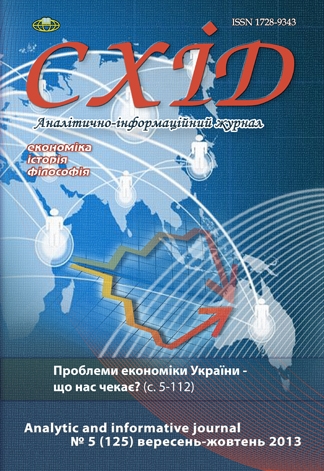Philosophy and Culture: Thinking about Global Crises
DOI:
https://doi.org/10.21847/1728-9343.2013.5(125).19078Abstract
The world is beset by what seem to be an interminable set of problems. Many of these, increasingly, are transnational, which is to say, that they transcend the borders of individual nations. Issues such as climate change and apparent global warming are fiercely debated, with many arguing that without a change in the way in which human beings abuse the environment, we are all doomed. The crisis surrounding the destruction of the nuclear reactor in Fukuyama, Japan as a result of the devastation wrought by the massive earthquake and tsunami points to human powerlessness in the face of the forces of nature. It also points to the need to show respect for those same forces. Other crises, such as the global financial crisis, also have had a profound impact on human lives. While it is difficult to quantify, the global financial crisis has undoubtedly been responsible for many deaths also, as aid money decreases and projects which may have helped solve housing shortages, provided sanitation and clean water are unable to proceed. There is a need to reconfigure capitalism so that it serves the common good, rather than the self indulgent needs of venal speculators. Glaring inequalities in the distribution of the common wealth of countries are just as evil in the United States, China, India, Australia and the United Kingdom, to name a few of the G20 nations, as they are anywhere else. The recent wave of protest throughout the Middle East which saw the ousting of the Libyan dictator, Gaddafi and the Egyptian president Mubarak, should not be seen as simply a sign of the inherent instability in those countries, but as a sign that oppressive policies wherever they are met will eventually result in the overthrow of corrupt regimes.The situation in Syria is, of course, particularly parlous and points to the need for stronger international law. This paper argues that philosophy has a serious role to play in thinking about global issues and, using the example of global ethics, shows how it is central in the explication of the values that underpin proposed solutions to global problems. Though cultures are different, it is proposed, recent history shows that human beings share common values and purpose.
Downloads
References
Twiss, S.B. (2004) “History, Human Rights and Globalisation”, Journal of Religious Ethics, 32, 1, 39-70.
Ozolins, J. (2009) “Human Beings as Resources: The Ethics of Buying and Selling Human Tissues and Organs”, Ethics Education, 15, 1, 5-19.
Pincock, S. (2010) “Overfishing is a problem in Australia, but we”ve come a long way in recent years in terms of fishing sustainability, say scientists and environmentalists”, available at: http://www.abc.net.au/science/articles/2010/09/09/3003951.htm Accessed: 2/4/2011.
Pettiford, L. and Harding, D. (2003) Terrorism: The New World War, Slough: Arcturus.
Freilich, J.D. and Guerette, R.T. (eds.) (2006) Culture, Conflict, Crime and Terrorism, Abingdon, Oxon.: Ashgate.
Zimmerman, E. (2011) “Globalisation and Terrorism”, European Journal of Political Economy, 27, S152-S161.
Boughton, E. (2005) “The Bhopal Disaster and its Aftermath: A Review”, Environmental Health: A Global Access Source, 4, 6.
Banks, G. and Ballard, C. (eds.) (1997) The Ok Tedi Settlement: Issues, Outcomes and Implications, Pacific Policy Paper 27, Canberra: National Centre for Development Studies and Resource Management in Asia-Pacific, Research School for Pacific and Asian Studies, Australiana National University.
Frynas, J. G. (1998) “Political instability and business: focus on Shell in Nigeria”, Third World Quarterly, 19, 3, 457-478.
Aristotle (1976) The Politics, Harmondsworth: Penguin, Book I Chapter 9, [1258a].
Nagel, T. (1989) The View from Nowhere, Oxford: Oxford University Press, 8-9.
MacIntyre, A. (2007) After Virtue, 3rd Edition, Notre Dame, Ind.: Notre Dame University Press.
Quine, W.V.O. (1960) Word and Object, Cambridge, Mass.: The M.I.T. Press.
See Gadamer, H-G. (1989) Truth and Method, 2nd Revised Edition, tr. rev. J. Weinsheimer and D.G. Marshall, London: Sheed and Ward, 235-236.
Wittgenstein, L. (1953) Philosophical Investigations, tr. G.E.M. Anscombe, Oxford: Basil Blackwell, para. 19.
Hans Kung (2005) Global Ethic and Human Responsibilities, Available online at: http://www.scu.edu/ethics/practicing/focusareas/global_ethics/laughlin-lectures/global-ethic-human-responsibility.html Accessed: 27/05/13.
Rorty, R. (1989) Contingency, Irony and Solidarity, Cambridge: Cambridge University Press.
United Nations Committee on Economic, Social and Cultural Rights (1998) Statement on Globalization and Economic, Social and Cultural Rights, May, 1998, Geneva: Office of the United Nations Commissioner for Human Rights.
Downloads
Published
How to Cite
Issue
Section
License
Copyright (c) 2013 John Ozolins

This work is licensed under a Creative Commons Attribution-NonCommercial-NoDerivatives 4.0 International License.
1. Authors bear responsibility for the accuracy of facts, quotations, numbers and names used.
2. Manuscripts are not sent back.
3. The publisher does not always agree with the authors' opinion.
4. The authors reserve the right to authorship of the work and pass the first publication right of this work to the journal under the terms of a Creative Commons Attribution-NonCommercial-NoDerivatives 4.0 International License. This license allows others to distribute (copy) the published work for non-commercial purposes, provided there is mandatory attribution to its authors and a link to the first publication in our journal.
5. The authors have the right to conclude separate supplement agreements that relate to non-exclusive work distribution in the form in which it has been published by the journal (for example, to upload the work to the online storage of the journal or publish it as part of a monograph), provided that the reference to the first publication of the work in this journal is included.

